A Guide To Improving Sleep Quality & Protecting Your Smile From Sleep Apnea
Waking up feeling tired even after a full night’s sleep can be more than just a bad habit or stress; it might be a sign of sleep apnea. While this condition is often linked to breathing and overall health, many don’t realize it can also have a direct impact on dental health. From teeth grinding to gum problems, the effects of sleep apnea can show up in the mouth long before other symptoms are noticed.
Understanding how sleep apnea and oral health are connected can help catch problems early, improve quality of sleep, and protect your smile. In this guide, we’ll explore what sleep apnea is, how it affects your teeth and gums, and the role your Clearwater emergency dentist can play in spotting and managing it.
Understanding Sleep Apnea
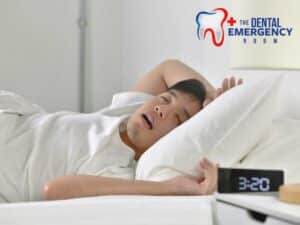
There are three main types:
- Obstructive Sleep Apnea (OSA): The most common form, caused when the throat muscles relax too much and block the airway.
- Central Sleep Apnea: Occurs when the brain fails to send the right signals to the muscles that control breathing.
- Complex Sleep Apnea: A combination of both obstructive and central sleep apnea.
Common symptoms include loud snoring, gasping or choking during sleep, morning headaches, excessive daytime fatigue, and difficulty concentrating. If left untreated, it can lead to serious health problems such as high blood pressure, heart disease, and dental issues (which may be your first clue something is wrong).
How Sleep Apnea Causes & Affects Your Health
Sleep apnea affects health by interrupting the body’s natural sleep cycles and reducing oxygen levels, which impacts nearly every system in the body. Each pause in breathing forces the brain to wake the body enough to reopen the airway, leading to fragmented, poor-quality sleep. Over time, this constant strain can have serious consequences, including:
- Low oxygen levels that put stress on the heart, increasing the risk of high blood pressure, irregular heartbeats, heart attack, and stroke.
- Hormone imbalances that lead to increased appetite, insulin resistance, and higher risk of type 2 diabetes.
- Damage to memory, focus, and mood regulation, raising the chances of anxiety, depression, and cognitive decline.
- Weakening of the immune system.
- Dry mouth, cavities, gum inflammation, and jaw pain.
How Sleep Apnea Symptoms Differ In Men, Women & Children
Sleep apnea symptoms can vary between men, women, and children. Women may experience symptoms like depression, insomnia, anxiety, and frequent waking, with post-menopausal women at an increased risk.
Men are more likely to have sleep apnea if they are overweight or have a family history of snoring. For both genders, being over 40 is an added risk factor.
Children can also experience sleep apnea, which may present with symptoms similar to asthma, hyperactivity, or bed-wetting.
How Dentists Can Help Detect Sleep Apnea
Dentists, especially those specializing in cosmetic dentistry, are often among the first professionals to spot the warning signs of sleep apnea, sometimes even before a patient realizes there’s a problem. During routine exams, they can identify oral and facial indicators linked to the condition, such as worn-down teeth from grinding, inflamed gums, scalloped edges on the tongue, or a small jaw structure that may restrict the airway.
Many dentists now incorporate sleep-related questions into patient assessments, asking about snoring, dry mouth, jaw pain, or morning headaches. If the signs point toward a possible sleep disorder, they can recommend further evaluation with a sleep specialist or order a home sleep test.
Some dentists are also trained in dental sleep medicine and can help manage mild to moderate obstructive sleep apnea using custom-made oral appliances. These devices gently reposition the jaw and tongue to keep the airway open during sleep, improving breathing and reducing snoring.
By paying close attention to both the mouth and overall health patterns, dentists can play a crucial role in detecting sleep apnea early and connecting patients with the right treatment options.
Effective Dental Treatment Options For Sleep Apnea
For many people with mild to moderate obstructive sleep apnea, dental treatments can provide an effective and more comfortable alternative to traditional CPAP therapy. Here are some of these treatments:
Custom Oral Appliances (Mandibular Advancement Devices)
- Worn during sleep to gently move the lower jaw forward.
- Helps keep the airway open and improves breathing.
Tongue-Retaining Devices
- Hold the tongue in a forward position to prevent throat blockage.
- Useful for cases where tongue obstruction is the main cause.
Why Are These Successful?
Compared to CPAP machines, dental devices are smaller, portable, and easier to adapt to for many patients. They don’t require electricity or a mask, making them convenient for travel and nightly use. However, they work best for certain cases and should always be fitted by a dentist trained in sleep apnea treatment to ensure comfort and effectiveness.
Preventing Dental Complications From Sleep Apnea
Sleep apnea can lead to several oral health issues, but with the right habits and care, many of these problems can be minimized or avoided. Here are some prevention tips you can consider:
- Schedule regular dental check-ups: Routine visits help detect early signs of teeth grinding, gum inflammation, or enamel wear.
- Address teeth grinding (bruxism): Ask your dentist about night guards or oral appliances to protect teeth from damage.
- Maintain good oral hygiene: Brush twice a day, floss daily, and use alcohol-free mouthwash to reduce the risk of cavities and gum disease.
- Stay hydrated: Mouth breathing from sleep apnea can cause dry mouth, so drink enough water throughout the day.
- Manage underlying causes: Work with your healthcare provider to treat sleep apnea effectively, reducing strain on both oral and overall health.
When To Seek Professional Help
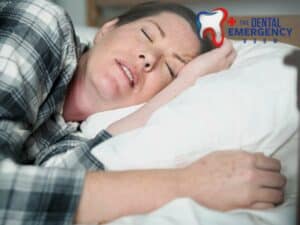
- Loud, chronic snoring that disturbs your sleep or others around you.
- Frequent pauses in breathing, gasping, or choking during sleep (often noticed by a partner).
- Persistent morning headaches, dry mouth, or sore throat.
- Jaw pain, teeth grinding, or signs of worn-down enamel.
- Excessive daytime sleepiness, difficulty concentrating, or mood changes.
If these symptoms are present, start with a dental check-up. Dentists can spot oral signs of sleep apnea and refer you for a sleep study if needed.
Find More Information & Guidance With Our Experts
If you’re experiencing jaw pain, worn teeth, dry mouth, or other oral changes alongside sleep issues, don’t wait. Contact our professional emergency dentists in Clearwater at The Dental Emergency Room today for a thorough evaluation and guidance on the next steps toward better sleep and a healthier mouth.

Dental Emergency Room
1935 Drew Street,
Clearwater, Florida 33765
Phone: 727-449-2424



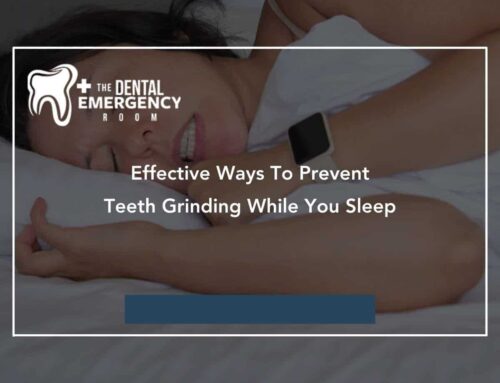
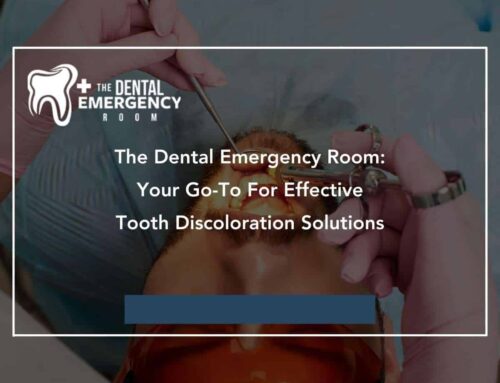
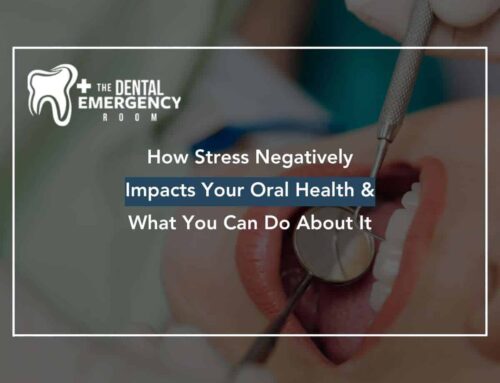


Leave A Comment